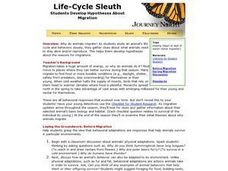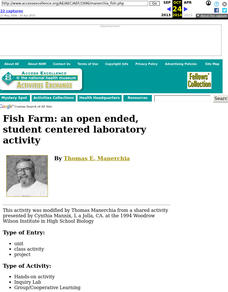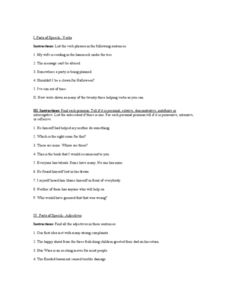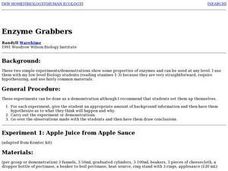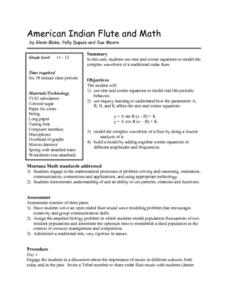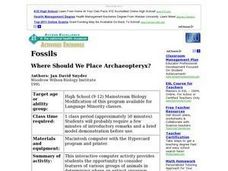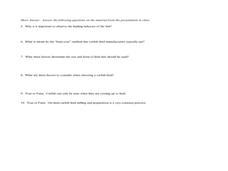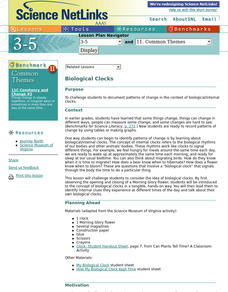Curated OER
Life-Cycle Sleuth
Students analyze an animal's life cycle and behaviors, and examine what animals need to stay alive and reproduce. They develop theories and hypotheses about the reasons for migrations, using the Journey North online project.
Curated OER
Lasting Legacies of Ancient Greece
Ancient Greece lesson plans can open up a world of information for students.
Curated OER
Fish Farm: an open ended, student centered laboratory activity
Students are contacted by a fictitious company which raises tropical fish to do basic research for them so that they might keep their production costs down. They need to know the optimum salinity in which to hatch the brine shrimp that...
Curated OER
Classify the Microbes
Students classify microorganisms into categories based on their characteristics. Pupils use a taxonomic key to identify organisms. They classify certain bacteria, protists, and viruses using a classification or taxonmic key.
Curated OER
Parts of Speech--Verbs
Verbs are the focus of this language arts worksheet. Students underline the verbs, or verb phrases, in 7 sentences, then make 2 original sentences with verbs in them. A good worksheet!
Curated OER
Branches of Science Lesson Plans
Teachers can use branches of science lesson plans to get students excited about science careers.
Curated OER
Who Dirtied The Water/Clean Water: Is It Drinkable?
Students enter the room, receive a film canister that contains materials that be added to the dirty water bell jar. They record on their data table who or what is doing the adding and the actual substance that has been added to the bell...
Curated OER
Simulation of Gene Splicing
Students use the exercise as a prelude to a "wet" lab or as a substitute for such a lab. It correlates well with colony transformation labs. This lab is recommended for students what have difficulty with the abstractions that genetic...
Curated OER
Finding the Ages of Rocks and Fossils
Students practice dating fossils. They learn the concept of "deep time"--that earth was formed billions of years ago. They experience excellent hand-outs and virtual age tutorial links.
Curated OER
Cool! Awesome! What is it?
Students work in small groups to brainstorm hypotheses about mysterious science photographs, read and interpret answers to the science photographs, cooperatively develop a set of clues for the images and develop their own science photo...
Curated OER
Pandemics and Epidemics
Young scholars evaluate data related to population growth, along with problems and soultions: disease cvontrol. They are able to explain how changes in habitat may affect organisms. Students evaluate evolutionary theories and processes.
Curated OER
The Physics of Skateboarding
Students are able to analyze gravity as an universal force. They are able to determine how the force of friction retards motion. Students are able to apply Newton's Laws of Motion ot the way the world works.
Curated OER
Enzyme Grabbers
Learners perform two experiments to show the properties of enzymes. They use pectinase to produce apple juice from applesauce to show enzyme action and then taste the difference between raw and boiled papaya seeds as evidence of enzyme...
Curated OER
American Indian Flute and Math
Students investigate the Math behind Musical instruments in this cross-curricular Math lesson on the Native American Flute and waveforms. The lesson can be accomplished in 6 days and includes an extensive materials list for successful...
Curated OER
Three Levels of Government
Students name and broadly classify the powers and duties of each level of executive government in Australia. They identify and examine areas of overlaid and cooperation between various executive levels. Students examine the nature of...
Curated OER
They're more evolved that way
Students explore the notion of local evolution, or genetic selectivity among different continent-based human populations. They consider specific examples of local evolution, such as lactose tolerance, skin color, and cognitive capacity,...
Curated OER
Comparing Ovaries And Testes
In this reproductive system worksheet, students compare specimens of rat ovaries and testes. They complete 5 short answer pre-lab questions, follow an 11 step procedure and answer 5 analysis questions.
Curated OER
Urban Effects on Inshore Plankton
Students investigate the effects of urban pollution on plankton. In this plankton and pollution lesson plan, students use samples of plankton collected in urban areas to observe the effects of pollution on plankton samples. They...
Curated OER
Solving Imaginary Crimes
High schoolers participate in a forensic science activity. In this crime solving lesson plan, students investigate fingerprints, and other crime scene evidence to solve an imaginary crime.
Curated OER
Where Should We Place Archaeopteryx?
High schoolers classify Archaeopteryx using pictures of actual fossils and scientist representations of how the animal might have looked. They compare Archaeopteryx's characteristics to those of the five extant vertebrate groups to...
Curated OER
Fossils-Where Should We Place Archaeopteryx?
Students explore an interactive computer activity that provides the opportunity to look at features of various groups of animals and determine where an extinct organism might be classified.
Curated OER
Aquaculture Science
Students research the different careers in aquaculture. In this aquaculture lesson students complete activities that include a PowerPoint presentation.
Curated OER
Water 1: Water and Ice
Students investigate water in its solid and liquid form. In this states of matter lesson plan, students experiment to see what happens as water goes from a solid, ice, to a liquid, water, and back again. They write about and illustrate...
Curated OER
Inquiry-based Investigations into Pond Water Microorganisms
Learners become familiar with common microorganisms and experience exploring the microbial world.


